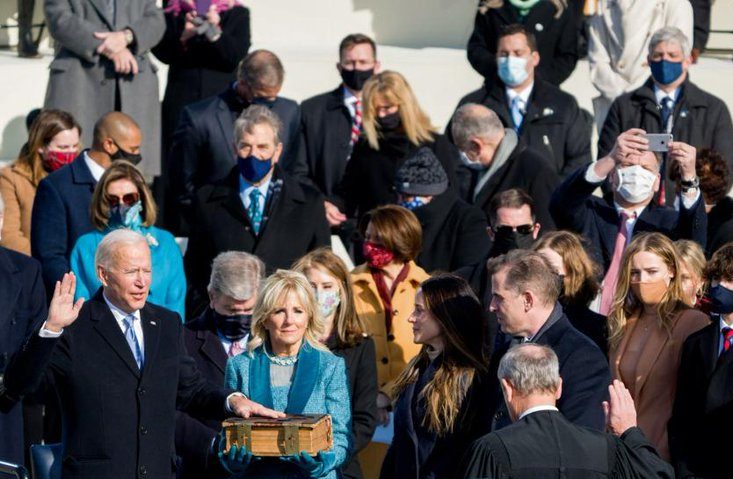 @POTUS Twitter
@POTUS Twitter
This Hill We Climb: Reinvesting in American Leadership
“So here is my message to those beyond our borders: America has been tested and we have come out stronger for it. We will repair our alliances and engage with the world once again. Not to meet yesterday’s challenges, but today’s and tomorrow’s. We will lead not merely by the example of our power but by the power of our example. We will be a strong and trusted partner for peace, progress, and security.”
A New Message: Leadership by Example
Joe Biden’s inaugural address as the 46th President of the United States brought resounding hope for a new visible and consistent American message based on the demonstration of national values. Faced with a crisis of credibility, an American message that recommits to national principles through behaviors and actions is foundational to the public diplomacy approach needed to rebuild American integrity and influence with foreign publics.
The steady decline of American prestige and credibility internationally has only been exacerbated by “America First” policies that renege international agreements, tarnish relationships with allies, and disengage from multilateral cooperation. In the past year, global witness to domestic failures have seemingly only solidified the growing loss of an influential American image. Police violence against the Black Lives Matter movement, an inadequate coronavirus response, and the ineffective handling of election mis- and disinformation that led to an attack on the U.S. Capitol have rocked international audiences and their belief in U.S. leadership.
Moving forward and rebuilding America’s image requires bold action and a consistent public diplomacy strategy. America must address domestic shortcomings to close the credibility gap between the values it professes and those seen in action, while also rejoining its international commitments. American trustworthiness is paramount to its ability to foster multilateral cooperation, progress its goals, and combat foreign disinformation campaigns. Without clear values and credibility in public messaging and the action taken in support of that message, a state’s cultural influence and soft power (its influence as a result of its attractiveness) are diminished. Today’s grand strategy must incorporate public diplomacy’s role in reestablishing American leadership and advancing its priorities.
First Up: An effective COVID-19 Response
After a year of an inadequate U.S. pandemic response, leading to the world’s highest number of coronavirus-related deaths, the world is watching to see if the Biden Administration can correct the nation’s recent stumbles and deliver on promises made. Rolling out a comprehensive COVID-19 plan to limit the proliferation of new cases, address the economic fallout, and distribute vaccines efficiently will be vital to rebuilding national credibility.
Failure to control the pandemic is already showing ramifications for how the United States will emerge in the post-pandemic world. For example, Europeans’ declining view of America as a global powerhouse and reliable ally is changing the nature of the traditional transatlantic partnership. A large majority of Europeans see China eclipsing the U.S. before the close of the decade, while Germans now see their country’s relationship with China as equally as important as its relationship with the United States. Further inaction threatens to isolate the U.S., leaving the nation behind as the world slowly recovers and looks elsewhere for leadership. While President Biden’s immediate executive orders provide a promising start toward creating a coordinated coronavirus response, the U.S. must also demonstrate global leadership through coronavirus-related foreign aid efforts and participation in the global vaccine distribution campaign.
Conclusion
The road ahead to national and international recovery is long and daunting. The work cannot be done by one administration alone. Success will rely on creating a consistent American message backed by supporting action across future administrations. This continuity of action across administrations will demonstrate a degree of reliability sorely lacking in America’s message.
Much of the work necessary to lead internationally must be undertaken in regards to domestic issues, as the example America sets at home is absolutely vital for its international image. As inaugural poet Amanda Gorman described it, we are still climbing a hill to see our national values realized: “For there is always light. If only we’re brave enough to see it. If only we are brave enough to be it.” Restoring national prestige and reclaiming America’s place as a beacon to the world requires more than a return to the status quo. It requires bold actions that exemplify core American principles at home and abroad as the U.S. re-engages with the world.





